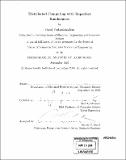| dc.contributor.advisor | Shafi Goldwasser. | en_US |
| dc.contributor.author | Vaikuntanathan, Vinod | en_US |
| dc.contributor.other | Massachusetts Institute of Technology. Dept. of Electrical Engineering and Computer Science. | en_US |
| dc.date.accessioned | 2006-11-06T18:17:12Z | |
| dc.date.available | 2006-11-06T18:17:12Z | |
| dc.date.copyright | 2005 | en_US |
| dc.date.issued | 2005 | en_US |
| dc.identifier.uri | http://hdl.handle.net/1721.1/34354 | |
| dc.description | Thesis (S.M.)--Massachusetts Institute of Technology, Dept. of Electrical Engineering and Computer Science, 2005. | en_US |
| dc.description | Includes bibliographical references (p. 41-43). | en_US |
| dc.description.abstract | Randomness is a critical resource in many computational scenarios, enabling solutions where deterministic ones are elusive or even provably impossible. However, the randomized solutions to these tasks assume access to a pure source of unbiased, independent coins. Physical sources of randomness, on the other hand, are rarely unbiased and independent although they do seem to exhibit somewhat imperfect randomness. This gap in modeling questions the relevance of current randomized solutions to computational tasks. Indeed, there has been substantial investigation of this issue in complexity theory in the context of the applications to efficient algorithms and cryptography. This work seeks to determine whether imperfect randomness, modeled appropriately, is "good enough" for distributed algorithms. Namely, can we do with imperfect randomness all that we can do with perfect randomness, and with comparable efficiency ? We answer this question in the affirmative, for the problem of Byzantine agreement. We construct protocols for Byzantine agreement in a variety of scenarios (synchronous or asynchronous networks, with or without private channels), in which the players have imperfect randomness. Our solutions are essentially as efficient as the best known randomized Byzantine agreement protocols, which traditionally assume that all the players have access to perfect randomness. | en_US |
| dc.description.statementofresponsibility | by Vinod Vaikuntanathan. | en_US |
| dc.format.extent | 43 p. | en_US |
| dc.format.extent | 1925681 bytes | |
| dc.format.extent | 1925680 bytes | |
| dc.format.mimetype | application/pdf | |
| dc.format.mimetype | application/pdf | |
| dc.language.iso | eng | en_US |
| dc.publisher | Massachusetts Institute of Technology | en_US |
| dc.rights | M.I.T. theses are protected by copyright. They may be viewed from this source for any purpose, but reproduction or distribution in any format is prohibited without written permission. See provided URL for inquiries about permission. | en_US |
| dc.rights.uri | http://dspace.mit.edu/handle/1721.1/7582 | |
| dc.subject | Electrical Engineering and Computer Science. | en_US |
| dc.title | Distributed computing with imperfect randomness | en_US |
| dc.type | Thesis | en_US |
| dc.description.degree | S.M. | en_US |
| dc.contributor.department | Massachusetts Institute of Technology. Department of Electrical Engineering and Computer Science | |
| dc.identifier.oclc | 70078324 | en_US |
